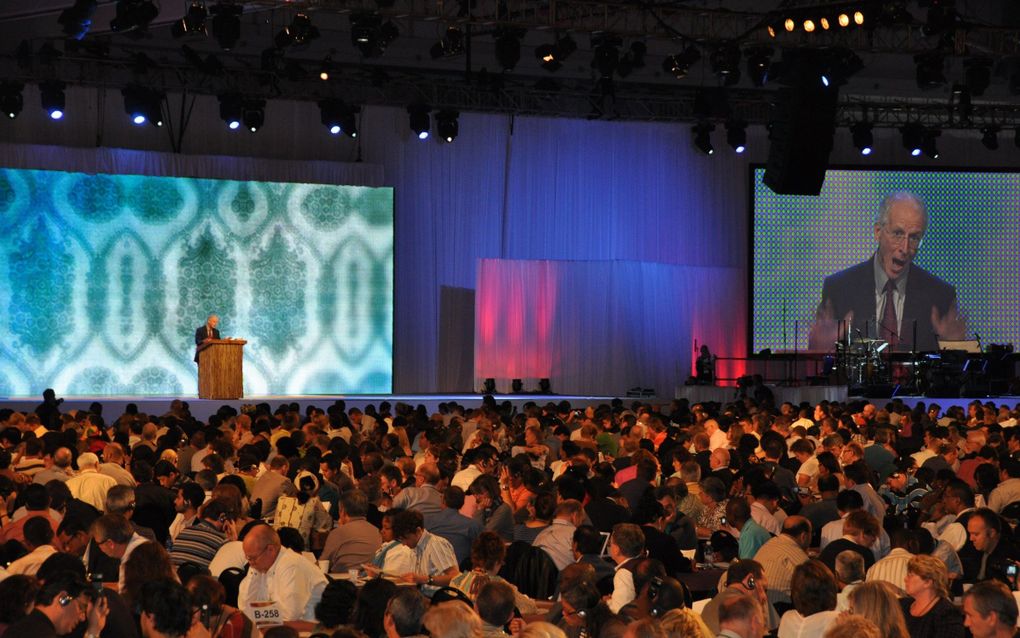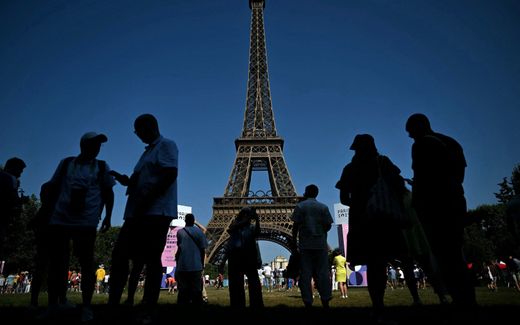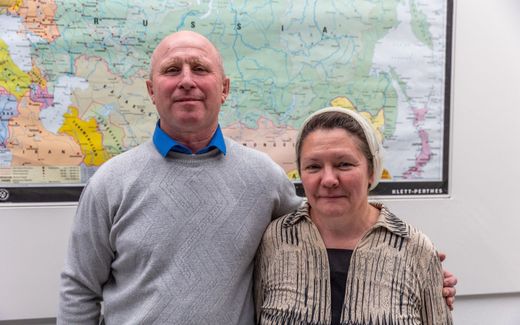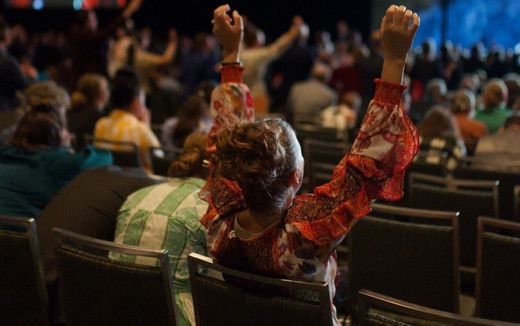Look in Seoul how the mission is progressing worldwide
23-09-2024
Christian Life
Maarten Stolk, RD

A previous mission congress from the Lausanne Movement. Photo RD
Christian Life
In South Korea, the largest missionary conference is happening this week. Some 5,000 participants from around the world are considering how best to engage people with the Gospel, especially in this day and age.
Receive CNE's weekly newsletter? Feel free to sign up here.
More than 150 experts on mission and evangelism have been co-writing the 'State of the Great Commission' report, which maps the current state of the mission. It is a kind of travel guide for the 5,000 or so people from around the world who attend the Lausanne Movement's World Evangelisation Congress in the South Korean city of Incheon this week. The guide shows what the mission field looks like now, where the church wants to be in 2050 and what the "gaps and opportunities are" along the way.
The 'Lausanne IV' missionary conference kicked off in the South Korean city of Incheon, near Seoul, on Sunday. Five thousand people from nearly 200 countries are attending the seven-day conference. Another 5000 people follow the lectures and deliberations online.
The report has not become a thin booklet: in more than 500 pages, it discusses, among other things, current global Christianity, the number of missionary workers, Bible translations and (un)reached peoples. However, it also touches upon themes that, the researchers believe, will become increasingly important in missionary work in the coming years, such as questions around gender and sexuality, digital developments, and care for creation.
Discipleship
Radical discipleship, called for by the previous Lausanne Congress in 2010, remains an important task for Christians in the years to come, says Dr Matthew Niermann, lecturer at California Baptist University in the United States and project leader of the State of the Great Commission. This means that Christians should follow Christ and make Him known in their whole way of living in the place where they live. "One of the key findings of the report is that evangelical leaders worldwide see a lack of discipleship among Christians. This is one of the biggest hurdles in the progress of the Great Commission."

He is also regularly struck by how "rapidly and dramatically" the world has changed since 2010. "From the rise of the digital age to the profound question of what it means to be human, from global demographic changes to declining trust. This observation further reinforces the importance of knowing the world so that the Gospel can be known by the world."
Digitalisation
Besides promoting discipleship (following Christ) Niermann sees the increasing digitalisation of the world as one of the main challenges in missionary work. Online platforms provide many people with a community, and they form an important part of their identity.
In a 'world of screens' −the average screen time worldwide is 6.37 hours a day− digital communities will become the main "social unit" where human communication takes place, the report's authors believe. "So when we talk about the love for our neighbour (Matthew 22:39), we are not just talking about loved ones who are geographically close, but also those we regularly encounter online." Christians carry the image of God "in every part of their lives, online and offline, in both physical and digital communities".
Niermann believes that it is not enough for the church just to be present on digital platforms. "To succeed in their mission, Christians must cross these digital boundaries."
Digital communities are never the ultimate goal, the report says. That is the church, the physical community, where people hear the Word and are equipped. "God's medium to spread the Gospel and make disciples was not a stand-alone tweet. Salvation and sanctification do not depend on digital means."
Ageing population
Missionaries will also have to increasingly take into account the globally ageing population, the US research leader believes. "People aged 60 and above are the fastest-growing population group. They are expected to increase from 1 billion today to 2.1 billion in 2050. Global ageing has not been a primary focus of Christian mission in recent decades. This is a major failing because there is an extraordinary opportunity to reach the rapidly growing number of over-60s with the Gospel and make them disciples."
According to the report, research shows that "seniors value spirituality more as they get older", although a person "does not become spiritual just because they get older".

Globally, 84 per cent of adults say religion is an important part of their daily lives. "The rapidly increasing ageing population offers more opportunities to engage older people in the Gospel message. Many are trusting Christ on their deathbeds, and many are coming to faith in old age."
No one disputes the importance of youth pastors, the researchers conclude. "So why the hesitation for senior pastors?"
Providence
The report tries to look into the near future, but whether it will really all turn out as described is "not a foregone conclusion", according to Niermann. An "unexpected outpouring of the Holy Spirit" or "unforeseen global tragedies" cannot be predicted, he says. "God is in control. As we work diligently to contextualise the Gospel, we can say with confidence that the world will not be the same, and the church's mission to make the Lord known will not look the same. Through it all, we must trust in God's providence."
Lausanne Movement
The Lausanne Movement, formed in 1974, is a global network of evangelical Christians who work together for world evangelisation. The missionary conference in Incheon, a port city of some 3 million people in South Korea, started on Sunday and lasts till Saturday. Participants come from all over the world, from Ghana to Britain, from Argentina to Australia. They speak at the Songdo Convensia conference centre mainly about the current state of global mission and the fulfilment of the "Great Commission" until the year 2050: "Go ye therefore, and teach all the nations, baptising them in the name of the Father, and of the Son, and of the Holy Ghost; teaching them to observe all things whatsoever I have commanded you" (Matthew 28:19). The theme of the conference is "Let the church together proclaim and demonstrate Christ".

The agenda includes six Bible studies on the book of Acts, lectures on mission in cities and persecution, and "lessons from the global church", among others. Each afternoon, participants consider one of the 25 'gaps' identified by the 'State of the Great Commission Report' study: parts of the mission task where extra work is needed. For example, in bringing "unreached peoples" in contact with the Gospel or evangelism in the digital age.
The missionary conference in Incheon, near the South Korean capital Seoul, is the fourth in a row. American evangelist Billy Graham and British theologian John Stott spearheaded the first World Evangelisation Congress, held in Lausanne, Switzerland, in 1974. 'Lausanne II' was held in Manila (Philippines) in 1989, and the third edition was in Cape Town in South Africa (2010). All conferences culminated in a declaration –the Lausanne Covenant, the Manila Manifest and the Cape Town Commitment– that called on churches worldwide to get serious about Gospel proclamation and social justice.
The Lausanne Movement commemorates its 50th anniversary at the World Evangelisation Congress in South Korea. After the publication of the Lausanne Covenant in 1974, which focused on the authority of the Bible and the unique place of Christ, a committee was appointed to continue the work of the congress. With that, the Lausanne movement was born. Over the course of 50 years, the Lausanne Movement convened dozens of international congresses on many aspects of mission work. It also equipped Christians and encouraged them to take seriously the proclamation of the Gospel in their own environment.
Korean-American theologian Dr Michael Oh has been at the movement's helm since 2013. Speaking about the significance of 'Lausanne', he said earlier in an interview with the Dutch daily Reformatorisch Dagblad that the movement has not only led to more missionary activity but also to the "theological reflection on it, in the light of God's Word".
Christian mission is focused on the whole person, Oh said. "You cannot separate Gospel proclamation and relief work."
The Lausanne movement also promoted missionary work based on research. "Very good leaders can make very bad decisions if they don't have good information at their disposal", he said.
This article was translated by CNE.news and published by the Dutch daily Reformatorisch Dagblad on September 20, 2024
Related Articles









